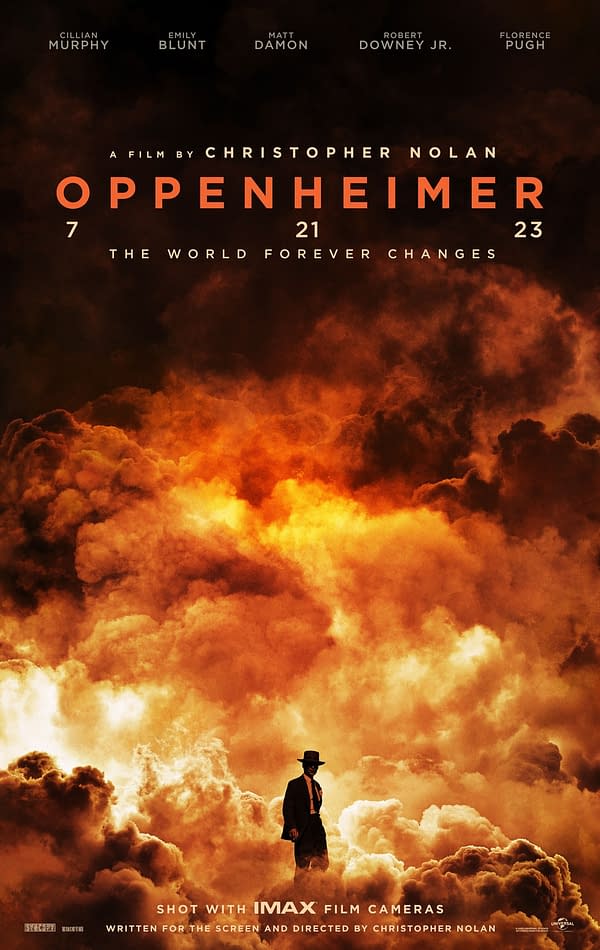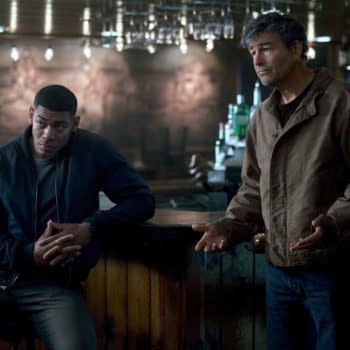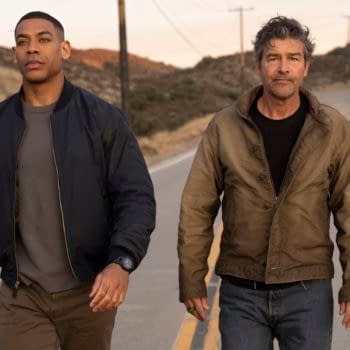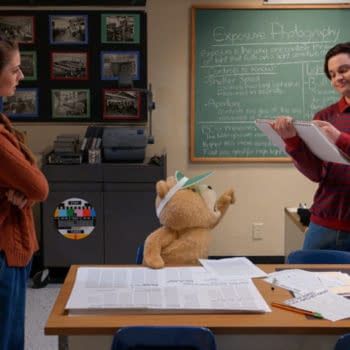Posted in: Kaitlyn Booth, Movies, Universal | Tagged: christopher nolan, oppenheimer, Review, universal
Oppenheimer Review: Tapping into Something Extraordinary and Terrible
Oppenheimer is a well-acted and directed biopic that makes some interesting decisions that cause the already insanely long runtime to feel even longer and even clunkier than it already did.
Oppenheimer is a well-acted and directed biopic that makes some interesting decisions that cause the already insanely long runtime to feel even longer and clunkier than it already did.
Director: Christopher Nolan
Summary: The story of American scientist J. Robert Oppenheimer and his role in developing the atomic bomb.
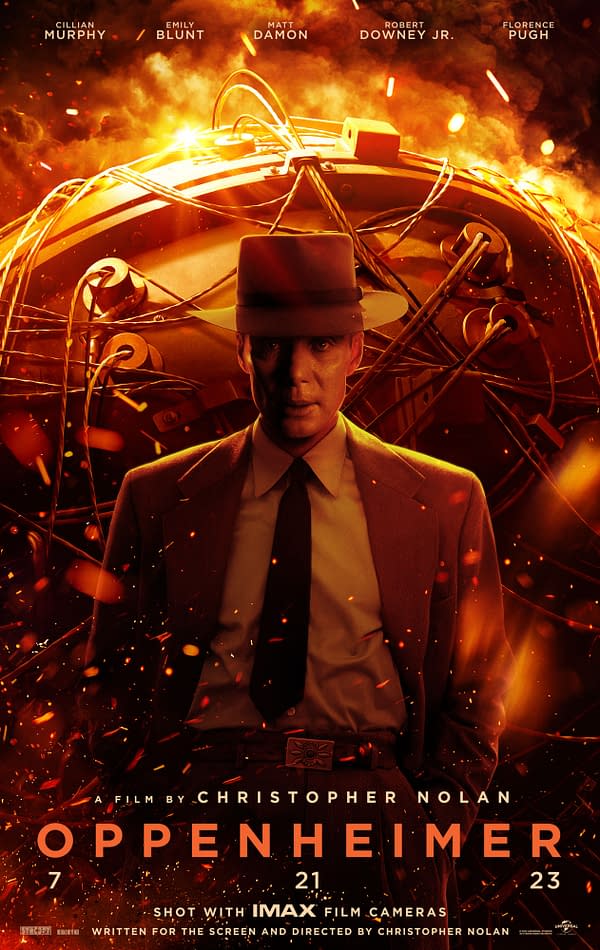
From the moment it was announced that Christopher Nolan would be doing a biopic on the life of J. Robert Oppenheimer, people were asking one question. Well, they were asking two: one was whether or not Nolan, who is infamous for his love of practical effects above all else, would set off an actual atomic bomb, and the other was whether or not he was going to be able to tap into the humanity one would need to explore a story like this. Nolan can tap into humanity plenty, and he is fascinated with characters in history like Oppenheimer. It's strange to pit this film against Dunkirk because they are similar in some ways but shockingly different in others. One of the ways they are the same is that both films decide to tell their story in a non-linear fashion.
The thing about non-linear storytelling is that you are juggling the pacing and structure of however many time periods you have going on to try and give the film a structure that works. Most non-linear storytelling films don't have a classic three-act structure because you would have to perfectly line up the events of one timeline to the other. While you can make that work, Nolan is juggling far too much to make everything line up in Oppenheimer, so the mid-point of creating the bomb lined up with the mid-point of the various meetings we are seeing. The issue for Oppenheimer is that the film is an epic, clocking in at three hours long. When you have something this long and have a structure and pacing this unconventional, it will make a very long movie feel even longer. While Nolan might hate the idea of streaming and mini-series, the way he decided to structure and pace this film would have been much more conducive to a three-part mini-series than a three-hour movie because while the film we have in front of us is stunning, it drags and goes on forever.
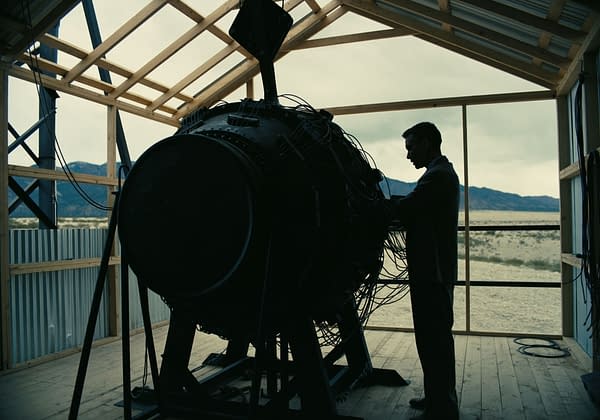
That's not to say the moments of tension don't work. One of the issues that many prequels and based-on-a-true-story movies run into is that they fail to be engaging enough to make the audience forget that they know how this ends. Oppenheimer, or at least the timeline leading up to the first test of the bomb specifically, does not have that moment. The minutes leading up to the first test is a moment that movies are made for; you're on the edge of your seat, your heart is racing, every time something looks like it might go wrong, you wonder if things will fail, you're holding your breath with everyone else as they finally hit that button. To capture that tension regarding something as well known and well documented as the first test of the atomic bomb is a credit to just how good of a filmmaker Nolan is. Does the entire movie make you forget you know how this ends? It does more than it doesn't, but that moment before the first test is filmmaking magic, if there ever was any.
While Dunkirk took the time to show us the soldiers dying on the beaches and the emotional fallout of everyone with Cillian Murphy's shell-shocked character, Oppenheimer takes a different approach. Still, it was almost a lose-lose situation where the answer doesn't appear to be obvious. For a movie about one of the greatest acts of war against another nation in human history, there is not a single Japanese person in Oppenheimer. The only moments when the film really seems to deal with what is happening is when they talk about the death toll going up after the various effects of the bomb are felt by generations, and we see Oppenheimer reacting to that. However, if Nolan were to show anything from the bombing or bombings, that would be war porn and feel grotesque. There was really no winning here, and I don't have an answer for how this issue could be addressed. But if anyone could have figured out a way, Nolan could have, even if I personally don't see what it could have been.
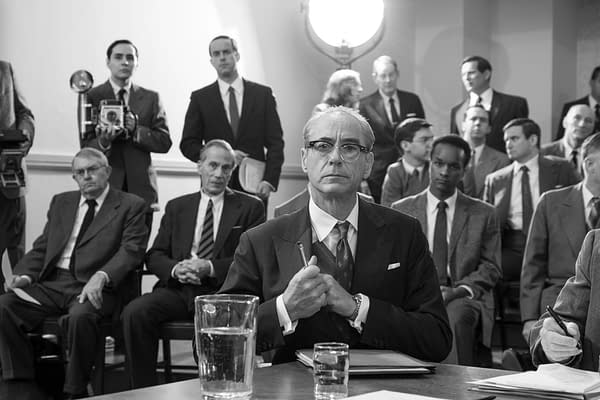
The acting across the board is pretty fantastic, though you do have to side-eye Nolan for casting Murphy as Oppenheimer because Oppenheimer was Jewish, and Murphy is not. Judaism is an ethnicity, not just a religion. It's a shame that a Jewish man doesn't play another Jewish man who helped shape the world, and we are seeing it again with Bradley Cooper in Maestro. The conversation is one that we will continue having, and we review the movie in front of us, and the performance we have from Murphy is top tier. This cast is stacked with fantastic actors all around, and there really isn't anyone who puts in a bad performance. It's lovely to see Alden Ehrenreich in another film after Hollywood decided Solo was a bomb. Same with Josh Hartnett, whom Hollywood hasn't let take on a role like this before, and hopefully, we'll see more from him. The women are sadly sidelined, but Florence Pugh and Emily Blunt can do no wrong, and we will hear nothing else in this house.
Oppenheimer is the kind of film meant to be seen on the big screen, so on National Cinema Day, if you haven't seen this one yet, you absolutely should. You should always seek out movies and see them in the format the director intended them to be shown on, so find the biggest screen possible and go to a theater with those big, comfy chairs. This movie is long; there are times when you'll feel that length, but it's also fascinating to watch Nolan keep all of these plates spinning. Like the film it opened against, it's a movie where it's miraculous that it works at all, even if this one stumbles a bit more than the pink one. Those three hours are worth the first test of the gadget, and the moments leading up to it where everything falls away, you forget the world exists, and you wonder if something extraordinary or something horrendous is about to happen–and since this is the testing of the atomic bomb, you're also left wondering if they are one and the same.
